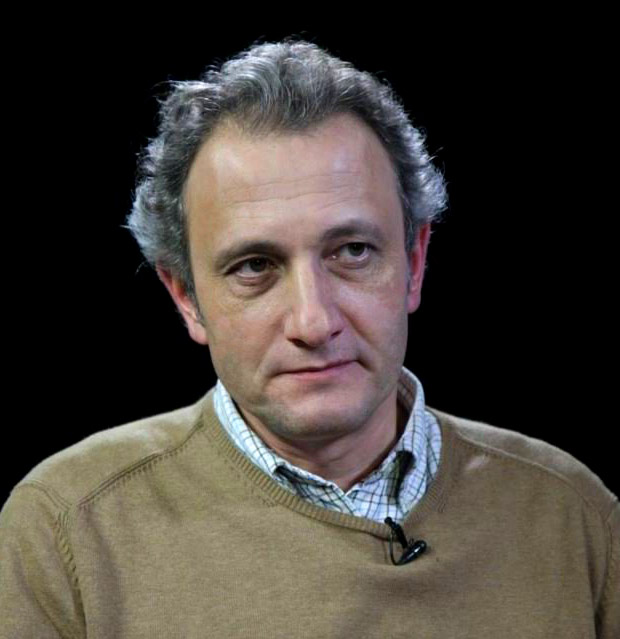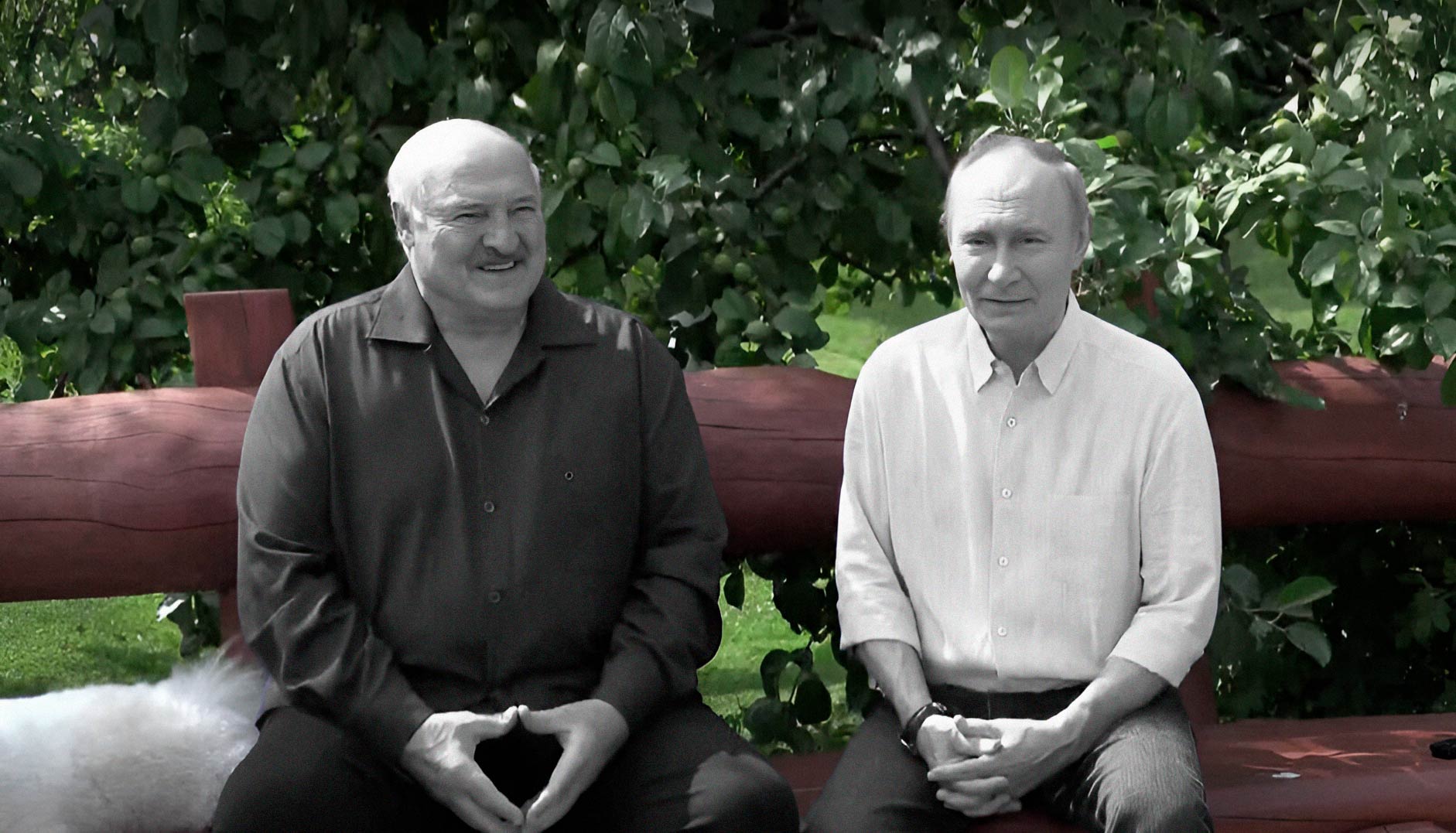 Alexander Lukashenko in the Kremlin's dramaturgy has long played the role of the Greek choir. When Putin needs to address the abstract city and the world, the Kremlin stages his monologues as a simple mise-en-scène, where the Greek choir in the person of Lukashenko, as in Sophocles' tragedies, delivers lines and clarifies the position of the main character. And somewhere barely visible are some «journalists». In one of the photos from the Russian president's press service, there was even a glimpse of a «
Alexander Lukashenko in the Kremlin's dramaturgy has long played the role of the Greek choir. When Putin needs to address the abstract city and the world, the Kremlin stages his monologues as a simple mise-en-scène, where the Greek choir in the person of Lukashenko, as in Sophocles' tragedies, delivers lines and clarifies the position of the main character. And somewhere barely visible are some «journalists». In one of the photos from the Russian president's press service, there was even a glimpse of a «
Return-cost mechanism
The dramaturgy succeeded, primarily thanks to Alexander Grigorievich. The Greek choir, performing like Yefim Kopelyan in «Seventeen Moments of Spring», as a voiceover described the situation:
«...Ukraine today should be running to ask him, Vladimir Vladimirovich: «Let's sit at the negotiating table, let's agree». Otherwise, in a month, a month and a half, two, I don't know, there won't even be any defensive structures left. The Russians will quietly gnaw it all away, seize it and move on, reclaim...»
With this improvisation of the Greek choir, there was a blunder. Lukashenko said «seize». Which, from the Kremlin's point of view, insisting on the defensive-liberation nature of what has been happening for three and a half years, is fundamentally the wrong assessment. Back in June 2022, Putin defined what was happening as «the return and strengthening of lands». And now, in accordance with this methodological setting, he corrected the Greek choir: «They will return. This is ours».
At this, both leaders laughed restrainedly.

The meaning of «return», especially achieved at such human and material-technical cost, remained unexplained. Not to mention that the boundaries of further «return» of «ours» are still not entirely clear. At least because some time ago the Russian president speculated about whether Russian troops would take the city of Sumy, or maybe they would. In the Constitution of the Russian Federation, in accordance with which the supreme commander-in-chief operates, there is no such territory. So, Putin refers to another document, probably Tyutchev's poem «Russian Geography»:
From the Nile to the Neva, from the Elbe to China,
From the Volga to the Euphrates, from the Ganges to the Danube...
Here is the Russian kingdom... and it will never pass away,
As the Spirit foresaw and Daniel predicted.
Or, as the Greek choir sang: «gnaw away, seize and move on» to the Elbe and the Danube, which, in fact, some sensitive European politicians fear.
Friedrich Engels called life «a way of existence of protein bodies». So from the mise-en-scène in the skete (monastery) it became clear that no one is going to stop the SVO, and it itself is becoming a way of existence of the mature Putinism system. Expectations from negotiations were «overestimated», Putin noted. It is believed that this was a remark addressed to Trump. But, generally speaking, «overestimated» expectations were among the majority of the Russian population, somewhat tired of the semi-military existence, inflation, mobile internet outages, air collapses, drone crashes. All for the sake of sovereignty and security. But where is that sovereignty that can be spread on bread, and where is security in principle. As noted by the Oryol governor-communist Klychkov, internet outages are nothing compared to «the feats of heroes», but the majority of the population, agreeing with the importance of «the feats of heroes», still wanted to know when normal life would begin. This is what they «expected» after the feats.
Now there will be Trump's tariffs. Chronic inflation and stagnation with a decline in production and further lagging of labor productivity behind overheated wages will remain. Budget deficit, income reduction, and sequestration of expenses not related to military purposes. The relative well-being of today's Russian economy is the light of a dead star, the result of state budget stimulation, which always gives an effect, but the effect is short-term. This is reflected in current economic indicators — from inflation to consumption and demographics. Including those that are gradually being classified. And what is classified, there are problems with.
To the nearest «Oreshnik»
Trump's tariffs, inconveniences in everyday life, security problems, and stagflation are nothing compared to the importance of the SVO. And as Putin expressed at one of the economic meetings back in 2016, compared to the «thousand-year history of Russia». It is with this that the God-bearing people will be fed, moving to the level of existence in the skete. Ordinary people are waiting not for a serial «Oreshnik» and not for what the regime is preparing for them in the new legislation for nuts, but for a full and inexpensive consumer basket without drones falling on their heads.
Here is the question: Is Trump also «nothing» compared to the educational significance of the oprichnina and, for example, a four-day workweek at the country's key car factories? «But we make rockets» — this has already been. But while the regime was carrying out «import substitution» — that is, replacing imports from the West with imports from the East — this very Europe, about which much unflattering was said in the skete (and it has problems with sovereignty and with the economy), released dozens of new, including cheap, modern cars. And the Putin regime released nothing but a service center for the Chinese brand «Haval» under the «Gazprom» skyscraper in Lakhta. This is a small but accessible example of the inefficiency of a rigidly autocratic, reveling in its imperial messianism, militarized system that has unprecedentedly for the 21st century lowered the price of human life.
Putin would like to continue the SVO and at the same time have a somewhat dim-witted and naive Trump in his pocket, to divide the world into three with him and Chairman Xi. But one must decide — here something one. And Putin on Valaam decided — imperial advancement to the West by military means is more important to him than diplomatic and geostrategic games with the United States.
In this logic, Putin would like to get «all ours», and then engage in building relations with the US as a superpower with a superpower. But then Trump may not be in the Oval Office, and friend Donald himself may refuse to communicate with the Kremlin, and the degree of exhaustion of Russia by Putin's experiment will deprive it not only of soft but also hard power. And it lost its soft power long ago — the empire with all the SCO and CSTO exists only in Putin's imagination. It's like a game of Solaris with the human mind, reproducing phantom pains of a person as if in reality. But just because some entity seems real, it does not cease to be imaginary and phantom, as in Tarkovsky's and Lem's «Solaris». There is some fatigue from the fact that a whole country, and almost the whole world with it, are forced to live in Putin's head. It's time to return from the space station spinning around the treacherous Solaris to the earth. «Realities on the ground» — they are in the closing data of Rosstat.
Monastic economy
In the exchange with the Greek choir, Putin touched on several more topics. One of them is corruption in Ukraine, which somehow mysteriously, from the autocrat's point of view, turned out to be connected with the lack of sovereignty of this state. As well as the lack of citizens' influence on power.
There is something wrong with the logic here. It was precisely the citizens' speeches — free and unsuppressed — that led to Zelensky adjusting his position on anti-corruption bodies. Moreover, it is necessary to remind that the Ukrainian president himself was elected in free competitive elections and there are no legal grounds to call him illegitimate. If hostilities ceased or at least a clear truce occurred, new elections would be possible. How to conduct a presidential campaign, who will vote — people in trenches, millions of Ukrainians who became refugees, including those who now live in Russia? As for legitimacy, there remain serious questions about the 2020 procedure for resetting the terms of the Russian president — it would be better not to touch on the topic of legality and legitimacy, especially in autocracies, this is thin ice. Corruption? And in which country is the entire leadership of the Ministry of Defense in prison, where several officials are arrested a week? Where did a whole Minister of Transport shoot himself? Where power and property are merged to indistinguishability, and the upper layer of bureaucracy is indecently and mysteriously rich in terms of income? Where all public organizations engaged in public control of power are destroyed and recognized as undesirable? It seems, precisely in Putin's Russia.
Putin gave an assessment of Europe:
«...It was clear that the European Union, Europe, did not have much sovereignty. Today it has become obvious that it has none at all. And immediately following this — in the critical situation that has developed — are economic losses, and the loss of political sovereignty now leads to the loss of economic sovereignty, and to colossal losses...»
Here, too, a number of clarifying questions arise. What does the lack of European sovereignty consist of? What economic losses does Putin mean? Tariffs? Soon the Russian Federation will also receive Trump's hundred percent tariffs. But there is no particular doubt that European economies will withstand, as will the European Union itself as a political entity.
The European Union is perhaps the most successful project in human history, it is ridiculous to compare its effectiveness with the collapsed and still agonizing empire of the USSR or Putin's imaginary empire. United Europe emerged after World War II as an anti-war project — and European democracies have not fought each other since, which is why decades later all post-Soviet countries so eagerly sought the umbrella of the EU and NATO. Former enemies — France and Germany — reconciled, and Germany itself turned into a country with political democracy and a market economy, going through unification and a period of rethinking its past. Europe — since the times of the Coal and Steel Community and the single market, so Trump's tariffs cannot kill the interdependent and diversified (unlike the Russian) European economy.
Russia had a chance to become a partner of Europe and was one, due to which the market economy largely rose, the market was filled, direct foreign investments appeared, new technologies, goods, and jobs. Finally, there was spatial connectivity with the world and cultural enrichment. But this is what scared Putin and his «friends», because of Russia's openness, they feared losing their power. A closed Russia, a poor Russia, a militarized and intoxicated with nationalism and the imperial idea, a Russia losing touch with world culture — is more manageable. But no one knows the limits of the effectiveness of such a system in terms of maintaining power by an autocrat.
There are situations where even the Greek choir will not help. Especially since it cannot be called sovereign, as Putin insists — it is heavily dependent on the performer of the main role of the ruler of BRICS, SCO, and other abbreviations. Skete, fasting, and prayer are not the most successful ways to solve growing and, it must be admitted, man-made political problems. Unless you truly retire to a men's monastery in time. But even for this, the time is also missed. Therefore, everything will continue to «go according to plan».
* Andrey Kolesnikov is considered a «foreign agent» by the Ministry of Justice of the Russian Federation.
Photo: 1tv.ru.